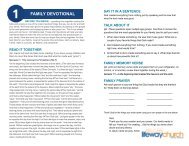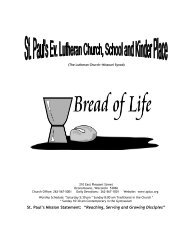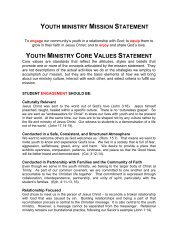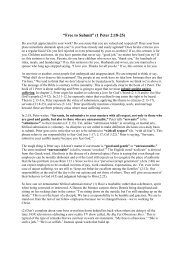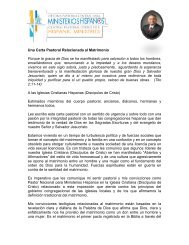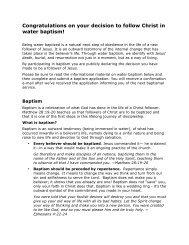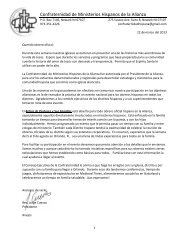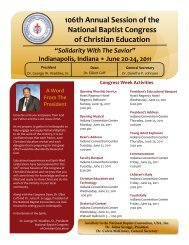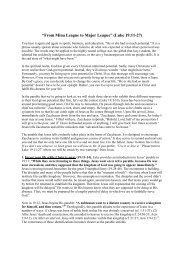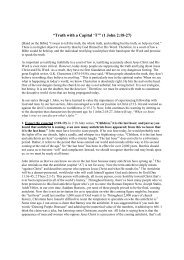“Secret Service” (Matthew 6:1–18) - Razorplanet
“Secret Service” (Matthew 6:1–18) - Razorplanet
“Secret Service” (Matthew 6:1–18) - Razorplanet
Create successful ePaper yourself
Turn your PDF publications into a flip-book with our unique Google optimized e-Paper software.
<strong>“Secret</strong> <strong>Service”</strong> (<strong>Matthew</strong> 6:<strong>1–18</strong>)<br />
“If you’ve got it, flaunt it!” Typically, this expression means: If you have a great body, don’t hide it under<br />
modest attire. Show yourself off for the world to see. If you have a brilliant mind, don’t be humble and<br />
unassuming. Expose the genius within. If you have money, spend it so that people know you’re loaded.<br />
Perhaps you can see the problems with the notion, “If you’ve got it, flaunt it!” Yet, for some bizarre<br />
reason many Christians assume that this expression is valid in the spiritual realm. It’s common for<br />
Christians to brag about how much they give, how much they pray, how much they serve, and how<br />
spiritual they are. Honestly, we’ve all been guilty of this behavior. It’s easy to be spiritually smug and let<br />
pride enter into our lives. We all want to be recognized and appreciated. We all want to impress people<br />
with our gifts and devotion. Yet, the Bible is clear that we must seek to impress God alone. 1 This requires<br />
a motives check-up. After all, motives matter when it comes to being approved and rewarded by God.<br />
This means you must do the right thing in the right way. 2 In Matt 6:<strong>1–18</strong>, Jesus shares three practices 3<br />
that will enable you to do the right thing in the right way.<br />
1. Give without fanfare (6:1–4). Jesus urges you and me to give with pure motives that please God. He<br />
begins in 6:1 with a principle 4 that introduces and summarizes 6:<strong>1–18</strong>. Jesus says, “Beware of practicing<br />
your righteousness before men to be noticed 5 by them; otherwise you have no reward 6 with your<br />
Father 7 who is in heaven.” The word “beware” 8 always warns of danger ahead, like a bridge being out<br />
of order or a road being under water. 9 To refuse to obey such a sign is both foolish and dangerous. Here,<br />
Jesus warns you to beware of seeking to impress people. He doesn’t say that you can’t be impressive.<br />
Many Christians are impressive people. Jesus is not opposed to public righteousness 10 that is an act of<br />
worship (cf. 5:20). We are commanded to be “salt” and “light” (5:13–16). Jesus’ primary concern is with<br />
your motives. God looks at the heart (motive) before the hand (action)! If your motives are to hear people<br />
“ooh and ah” over your righteousness, 11 you have your reward…but it is on earth, NOT in heaven. Jesus’<br />
words are absolute. He is saying, “Anyone who does a good deed so as to be seen and appreciated by<br />
others will lose his or her reward, no matter how ‘good’ and beneficial the deed is. There are absolutely<br />
no exceptions!” 12 It is imperative, therefore, that you do the right thing in the right way.<br />
After laying down the overarching principle, in 6:2–4, Jesus focuses on the topic of financial giving. 13 He<br />
says in 6:2: “So when you give to the poor, do not sound a trumpet before you, as the hypocrites 14 do<br />
in the synagogues and in the streets, so that they may be honored by men. 15 Truly I say to you, 16<br />
they have their reward in full.” 17 Jesus says “when” you give. The word “when” is a key word<br />
throughout this entire passage. Jesus does not say “if” but “when.” He assumes that His disciples will<br />
give…including YOU! This means giving is not optional. Yet, maybe you’re thinking, “I’m barely<br />
making ends meet and you want me to give?” Absolutely! You’re never too poor to give. If you’re<br />
struggling to get by, give to someone who is struggling more than you. The Lord will meet your needs,<br />
especially if you are obedient to give. The question that Jesus is addressing in this verse and in this entire<br />
passage is not “when” but “why.” Why do you do what you do? It is important to see that Jesus does not<br />
forbid public giving, but He doesn’t want you to “sound a trumpet.” This is a figurative phrase from<br />
which we get our expression “toot your own horn.” 18 In other words, do not give for the purpose of being<br />
“honored” by people. 19 When the offering plates are passed, don’t cough loudly just as you’re giving.<br />
Don’t slam-dunk your offering into the plate. Don’t give so that your name will be inscribed on a<br />
building, on a plaque, on a brick, or in a list of donors for all to see. If you do, that will be your reward.<br />
The word translated “in full” (apecho) is a technical term for commercial transactions and means to<br />
“receive a sum in full and give a receipt for it.” 20 When you seek to impress people you are not giving but<br />
buying, and you get what you paid for. [Take out a receipt.] This receipt shows that I made a purchase at<br />
Jack In The Box and received some “food” (if you can call it that). I paid for my food. I received it in full<br />
and consumed it. End of story. This is equally true when I seek to impress people instead of God. I am<br />
paid in full with no hope of any future reward.
Fortunately, Jesus offers an alternative to giving with fanfare. In 6:3–4 He says: “But when you give to<br />
the poor, 21 do not let your left hand know what your right hand is doing.” 22 Please don’t take this<br />
verse literally or else you will have to undergo a lobotomy. This is a hyperbolic phrase that means “give<br />
in secret.” 23 Don’t give with your right hand while you wave your left hand in the air. Instead, just drop<br />
your check in the offering or send it in the mail, without drawing attention to yourself. Fold the check.<br />
Keep the envelope sealed. Give in a spirit of humility and simplicity, as an act of worship. 24 Try giving<br />
anonymously sometimes, even if it means that you do not receive a tax deduction. Why? Verse 4 says,<br />
“so that 25 your giving will be in secret; and your Father who sees what is done in secret will<br />
reward 26 you.” Again, there’s nothing wrong with public giving that is an act of worship. But there’s<br />
plenty wrong with giving money to impress people. If you do, it is like taking municipal bonds and<br />
cashing them in early. You get accolades, but not nearly what you would if you waited. This is the<br />
principle of delayed gratification at work. You will receive your reward later, but from God Himself. 27<br />
Does this mean that you should never tell anyone what you give and who you give to? No! Acts 2:45 tells<br />
of Christians selling possessions and giving to the needy. In 4:36–37, Luke tells us that Barnabas sold a<br />
field and brought the money to the feet of the apostles. If Barnabas was looking for status and prestige,<br />
his motive was wrong. But it’s certainly false to say that it was wrong for others to be made aware of his<br />
gift, because Scripture itself reveals that! Barnabas’ act of generosity was commonly known among the<br />
believers and was publicly and permanently recorded in Acts. Numbers 7 lists the names of donors to the<br />
tabernacle. 1 Chronicles 29 tells exactly how much the leaders of Israel gave to build the temple. This is<br />
recorded in Scripture for our encouragement and motivation. Jesus does not object to the fact that people<br />
may know what you give, but that you would give in order to impress people rather than God. We need<br />
heroes in the church. We need to know that our friends and leaders are giving. This motivates and<br />
challenges us to give even more sacrificially. The key is: why do you give? Do you give to please God or<br />
to impress people? When it comes to giving, make sure you do the right thing in the right way.<br />
[Jesus urges you to give without fanfare. Why should you give in secret? Because God will reward you.<br />
The second practice is…]<br />
2. Pray without pride (6:5–15). Jesus’ teaching on prayer is the centerpiece of the entire Sermon on the<br />
Mount. 28 In 6:5–8, Jesus contrasts prideful and humble prayer: “When you pray, you are not to be like<br />
the hypocrites; for they love to stand and pray in the synagogues and on the street corners so that<br />
they may be seen 29 by men. 30 Truly I say to you, they have their reward in full. But you, 31 when you<br />
pray, go into your inner room, 32 close your door and pray to your Father who is in secret, and your<br />
Father who sees what is done in secret will reward you. And when you are praying, do not use<br />
meaningless repetition 33 as the Gentiles do, 34 for they suppose that they will be heard for their many<br />
words. 35 So do not be like them; 36 for your Father knows what you need before you ask Him.”<br />
Again, Jesus’ concern is praying to impress others. He is not opposed to long prayers or public prayers<br />
except when you are seeking accolades from people. Jesus’ point is: When you pray to impress people,<br />
you are paid in full. Instead, pray in secret and receive a reward from God. Perhaps a few questions would<br />
help. Do I pray frequently or more fervently when I am alone with God than when I am in public? Is my<br />
public praying an overflow of my private prayer? What do I think of when I am praying in public? Am I<br />
looking for “just the right” phrase? Am I thinking of the worshipers more than of God? Am I a spectator<br />
to my own performance? Is it possible that the reason more of my prayers are not answered is because I<br />
am more concerned about bringing my prayer to men than to God? 37 Do the right thing in the right way.<br />
In 6:9–13, we delve into what is commonly called “The Lord’s Prayer.” 38 I prefer, however, to call this<br />
“The Disciples Prayer” since it was designed for Jesus’ disciples. 39 In these five verses, there are a total of<br />
six petitions. 40 In 6:9–10, there are three petitions that promote God’s glory; 41 in 6:11–13, there are three<br />
petitions that concern our well being. 42 This pattern indicates that we should have more concern for God<br />
than we do for ourselves. 43
Petition 1: God’s person (6:9). Jesus says pray, “Pray, then, in this way: 44 ‘Our Father who is in<br />
heaven, Hallowed be Your name.’” Jesus does not say, “Pray this prayer verbatim three times a day.”<br />
He says, “Pray, then, in this way.” In other words, our prayers should resemble the categories and content<br />
of the Disciple’s Prayer—worship and petition. 45 This prayer is the skeleton and we are to add meat to the<br />
frame Jesus provides. The word “our” demonstrates that this prayer is for the gathered community, not<br />
private prayer. Only fifteen times was God referred to as the Father in the Old Testament. 46 Where it does<br />
occur, it is used of the nation Israel or to the king of Israel. Never was God called the Father of an<br />
individual or of human beings in general. He was Yahweh and Adonai. In the New Testament, Jesus<br />
comes on the scene and emphasizes the fatherhood of God. He expands the intimacy that we can have as<br />
we approach God in prayer. However, God is not your pal, your buddy, or the man upstairs—He is your<br />
Father who is in heaven! He is high and lifted up and He still expects to be approached with awe. The<br />
word “hallowed” means set apart. “Name” refers to personhood and character. “Hallowed be Your name”<br />
means, “Show the world who you are!” God wants His name exalted in our lives. You are to set apart<br />
God’s name as distinct from other names. 47 You are to honor His name. You are to ask God’s name to be<br />
made holy in your life. 48<br />
Petition 2: God’s program (6:10a). Jesus says pray, “Your kingdom come.” In the New Testament,<br />
God’s kingdom is expressed as both a present reality 49 and a future consummation. 50 Jesus inaugurated<br />
His kingdom during His earthily ministry, but the fulfillment of His kingdom will not be fully<br />
consummated until He sets His feet down in Jerusalem and rules and reigns. When this occurs, we will<br />
experience a theocracy (not a democracy) where Jesus is King. In the meantime, we pray that God’s<br />
kingdom will come in our life and eventually to the earth. As we approach our presidential election next<br />
week, our prayer must be, “God, may Your kingdom come.” You may be concerned that if your candidate<br />
is not elected the end is near. That may well be the case! Did you ever stop and think that God may be<br />
speeding His kingdom to earth by electing the candidate that you oppose? Regardless of who is elected,<br />
God will bring about His kingdom. You can count on it!<br />
Petition 3: God’s purpose (6:10b). Jesus says pray, “Your will be done, on earth as it is in heaven.” 51<br />
This is a prayer for God’s control of earth and your life as He has of heaven. In heaven, the angels<br />
respond to God’s commands perfectly and immediately. God expects this same type of obedience from<br />
you. This means that you go into your day saying, “Lord, I want to live this day for You. May Your will<br />
be done in my marriage, my family, my work, and my church. Use me to fulfill your will perfectly and<br />
immediately. I don’t want to make You look bad. I want to be Your representative.”<br />
Petition 4: God’s provision (6:11). This petition deals with our personal needs. Jesus says pray, “Give us<br />
this day our daily 52 bread.” This is not just talking about food. “Bread” is a figure of speech, 53 which<br />
represents our needs. 54 It’s interesting that twice in this brief sentence we have an emphasis on “today.”<br />
“Give us today what we need today.” 55 Jesus only promises you TODAY, not tomorrow, next week, or<br />
next year (cf. 6:34). He wants you to live in daily dependency upon Him. After all, you are not guaranteed<br />
tomorrow. Jesus wants you to know that you don’t provide for yourself, neither does your company, your<br />
spouse, or your family. He alone meets your needs. In this crashing economy it is tempting to be worried<br />
about your job, your investments, and your retirement. Now if that is where your confidence lies, be<br />
worried. In fact, worry yourself to death because things are bad and they may not get better! But if your<br />
confidence is in the Lord to meet your daily needs, you have nothing to worry about.<br />
Petition 5: God’s pardon (6:12, 14–15). This petition deals with our interpersonal relations. In 6:12,<br />
Jesus says pray, “And forgive us our debts, as we also have forgiven our debtors.” Jesus assumes that<br />
you and I will forgive. In 6:14–15, there is a P.S. to the Disciple’s Prayer. 56 Please read these words<br />
slowly and soberly. Jesus says, “For if you forgive others for their transgressions, 57 your heavenly<br />
Father will also forgive you. But if you do not forgive others, then your Father will not forgive your<br />
transgressions.” 58 Stop for just a moment and feel the full weight of these words.
In 6:14, Jesus promises forgiveness if you forgive others. In 6:15, He explicitly states that if you do not<br />
forgive others, God will not forgive you! What is Jesus saying here? This passage is not about salvation<br />
because Jesus’ audience is saved. The issue is fellowship. 59 Notice the phrase “your heavenly Father”<br />
(6:14). Jesus’ target audience is in the family. Yet, Jesus is saying that when you refuse to forgive, God<br />
withholds fellowship forgiveness. This means you will lack intimacy with God and He will not respond to<br />
your prayers. This may sound severe, but remember the underlying ethic in Jesus’ teaching is love—love<br />
for your heavenly Father and love for people. God loves you so much that He will allow you to come face<br />
to face with your sin. He will confront you with your refusal to forgive by withholding fellowship. This is<br />
to bring about deep repentance and restoration of the love between the parties involved. 60 So how should<br />
you respond in light of Jesus’ words? I propose three applications.<br />
Remember the debt you have been forgiven. There are five key Greek words in the New Testament for<br />
sin. Only one is used in the Disciple’s Prayer. It is the word translated “debts” (opheilema, 6:12). This<br />
word has to do with a balance owed. That’s why Jesus said, “Forgive us our debts.” Every time you sin,<br />
you go into debt to God. You have taken on an obligation you cannot possibly meet. It’s like charging<br />
$100,000 to a credit card with a $1,000 limit when you have only a $1 bank balance. Sooner or later, the<br />
collection agency is going to come looking for you. Sin makes us overdrawn debtors to God—even if we<br />
are already Christians. As a result, our fellowship with God is broken. Only compassion and forgiveness<br />
can balance the books. 61 The more aware you are of your great evil the more you will be able to forgive.<br />
If you feel that you are not as sinful as the next person, you can’t forgive. However, if you know God’s<br />
forgiveness you will forgive, for a forgiven person is a forgiving person. 62 Today, will you see anew and<br />
afresh the enormous debt that you owe God? Will you choose to see the sin that still pervades your life<br />
even though you are a believer? Will you be broken before God so that you can forgive those who sin<br />
against you?<br />
Rely on the Holy Spirit to enable you to forgive. The word “forgive” (aphiemi) literally means “to<br />
release, to let go of.” Simply put, forgiveness is letting go of my right to hurt you for hurting me. In the<br />
New Testament, the word forgiveness was used primarily to describe the release of someone from a<br />
financial obligation. Forgiveness gives up the right to hurt back. 63 When you forgive someone, you are<br />
saying, “What that person did to me was wrong. He has hurt me deeply and deserves to pay for his<br />
offense. But today I am releasing him of the obligation he has toward me. I am not forgiving him because<br />
he has asked to be forgiven or deserves to be forgiven. I am forgiving him because of the tremendous<br />
forgiveness God has offered me.” 64 Does biblical forgiveness work like a charm? Not in the sense that<br />
you may think. Although I have forgiven various individuals, fleshly thoughts toward these individuals<br />
still rear their ugly head. When this occurs, whether it is hourly, daily, weekly, or monthly, my goal is to<br />
release my negative emotions to the Lord. Forgiveness does not mean that you will forget, it means you<br />
let go of your desire to retaliate. Instead, you love your enemies and pray for those who persecute you<br />
(5:44). Obviously, this requires supernatural empowerment.<br />
Recognize the personal benefit of forgiveness. 65 It is possible to develop a root of bitterness that will<br />
defile you and many others (Heb 12:15). 66 If you choose not to forgive, you will be the one who suffers.<br />
In the end, those whom you don’t forgive are holding you as a hostage. 67 Stop for just a moment and think<br />
about the person or persons that you have chosen not to forgive. [Show the congregation a Ziploc bag<br />
with a rotten potato.] If I could, I would have you purchase as many potatoes as you have enemies. For<br />
every enemy, I would then have you write your enemy’s name on a potato and then date it. I would then<br />
have you carry this Ziploc with you everywhere—to work, to church, into the shower, to the dining room<br />
table, even into your bed. Perhaps your bag would become quite heavy. Lugging this around, paying<br />
attention to it all the time and remembering not to leave it in embarrassing places would be a hassle. Over<br />
time the potatoes become moldy, smelly, and begin to sprout “eyes.” This is what happens when you<br />
refuse to forgive. Often, we think of forgiveness as a gift to the other person, but it clearly is a gift to<br />
ourselves. 68 Save yourself some grief. Unload your unforgiveness today.
Petition 6: God’s protection (6:13). This final petition deals with our spiritual concerns. Jesus says pray,<br />
“And do not lead us into temptation, but deliver us from evil.” If this passage teaches that God leads<br />
us into temptation, then doesn’t that contradict James 1:13, that God does not tempt anyone? The word<br />
translated “temptation” (peirasmos) can mean “temptation,” “testing,” or “trial.” Prior to the time of the<br />
New Testament, this word only meant “testing” or “trial.” The New Revised Standard Version translates<br />
this word “trial” in 6:13. 69 If their understanding is correct, Jesus apparently is teaching that we should<br />
pray that God would allow us to escape from trials. 70 The idea of escape or deliverance is carried on in<br />
6:13b: “deliver us from evil.” Most English versions read: “deliver us from the evil one” 71 rather than<br />
simply “deliver us from evil.” Either translation is possible, but “deliver us from the evil one” is the better<br />
translation, 72 particularly since Matt 4:1–11 records the temptation of Jesus by Satan, the evil one. The<br />
point of all of this is that you are incapable of handling spiritual problems on your own. You need God’s<br />
help. He alone is capable of handling each and every problem you face. As we come to the conclusion of<br />
the Disciple’s Prayer in 6:13, the NASB has the final sentence in brackets. Other versions have this<br />
sentence in a footnote. Scholars tell us that these words are probably not part of the original prayer taught<br />
by Jesus, but that they were added later as a doxology of praise. Although they may not be part of the<br />
original, they make a fitting conclusion to the prayer: 73 “For Yours is the kingdom and the power and<br />
the glory forever. Amen.” Whether inspired or not, these words remind us that God is great and that He<br />
is in control. As you reflect on these words, please recognize that when you fail to pray you are basically<br />
saying that you can make it on your own. This is the epitome of arrogance. 74 So acknowledge your need<br />
and pray without pride.<br />
[Jesus says that you must pray without pride. When you do, He promises that He will reward you. The<br />
third and final practice is…]<br />
3. Fast without notice (6:16–18). Jesus hits upon the controversial topic of fasting. In a world of golden<br />
arches and pizza temples, this is a hard word. We are gluttons who worship food. Nevertheless, Jesus<br />
says, “Whenever you fast, do not put on a gloomy face as the hypocrites do, for they neglect their<br />
appearance so that they will be noticed by men when they are fasting. Truly I say to you, they have<br />
their reward in full. But you, when you fast, anoint your head and wash your face so that your<br />
fasting will not be noticed by men, but by your Father who is in secret; and your Father who sees<br />
what is done in secret will reward you.” The Pharisees fasted twice a week (Luke 18:12), on Mondays<br />
and Thursdays. 75 But when they fasted, they looked miserable and tried to draw attention to themselves.<br />
They seemed to say, “Look at me; I’m fasting!” They are like some politicians who ride in helicopters<br />
over natural disasters. Their faces are grim and mournful, but it is only a “photo shot.” 76 Jesus says,<br />
“Don’t you be like them!” Instead, look to the positive examples in Scripture. Old Testament believers<br />
fasted (Neh 9:1–2; Dan 9:2–20). Jesus fasted in preparation for His earthly ministry (4:2) and implied that<br />
Christian disciples would fast following His brief ministry (9:15). The early church fasted (Acts 13:2–3;<br />
14:23; 2 Cor 6:5; 11:27). Yet, fasting is not commanded in any of the New Testament letters. 77 This is<br />
likely the case because many godly individuals cannot fast for medical reasons. However, fasting still<br />
seems to be assumed, even though it is not commanded. 78 So what exactly is fasting? In Scripture, fasting<br />
is typically a time of abstaining from food for the purpose of devoting one’s self and one’s time to the<br />
Lord. 79 We should not think of fasting as a way to get something from God. We fast as one means of<br />
drawing closer to God. 80 You become keenly aware of your dependence on God when you are very<br />
hungry. This is designed to stir us toward God. But be careful of your motives. Do not think things like,<br />
“This will help me lose weight or purify my system.” Fasting is to purify the believer’s heart, to spend<br />
time focusing on God, to learn to deny the physical in order to grow the spiritual. Fasting is for<br />
repentance, for sorrow, for purification. Fasting helps us become more sensitive to God. If you are going<br />
to fast make sure that your doctor gives you the freedom to do so. The motive and manner are crucial; the<br />
length and frequency are optional. Jesus cares about our motives. This is why He says, “Give without<br />
fanfare, pray without pride, and fast without notice.” Do the right thing in the right way.
It has been said, “The secret of religion is religion in secret.” Oswald Chambers (1874–1917) said, “My<br />
worth to God in public is what I am in private.” Who are you when no one is looking? That is the ultimate<br />
question. Do the right thing in the right way.<br />
Copyright © 2008 Keith R. Krell. All rights reserved. All Scripture quotations, unless indicated, are taken from the New American Standard<br />
Bible, © 1960, 1962, 1963, 1968, 1971, 1972, 1975, 1977, and 1995 by The Lockman Foundation, and are used by permission.<br />
Permissions: Feel free to reproduce and distribute any articles written by Keith Krell, in part or in whole, in any format, provided that you do not<br />
alter the wording in any way or charge a fee beyond the cost of reproduction. It is our desire to spread this information, not protect or restrict it.<br />
Please include the following statement on any distributed copy: by Keith Krell, Timeless Word Ministries, 2508 State Ave NE Olympia, WA<br />
98506, 360-352-9044, www.timelessword.com
Scripture References<br />
<strong>Matthew</strong> 6:<strong>1–18</strong><br />
2 Corinthians 8–9<br />
Luke 11:1–13<br />
Luke 18:1–8<br />
Acts 12:1–25<br />
<strong>Matthew</strong> 18:21–35<br />
<strong>Matthew</strong> 9:14–17<br />
Study Questions<br />
1. When I perform spiritual disciplines do I struggle with impure motives (6:1)? Am I able to discern the motives<br />
and attitudes of my own heart? If so, have I been able to honestly acknowledge what I sense to myself and<br />
others? Read 1 Corinthians 4:1–5. The Russian author Turgenev wrote, “I do not know what the heart of a bad<br />
man is like, but I do know what the heart of a good man is like, and it is terrible.” Do I agree with this<br />
assessment? Why or why not? Read Jeremiah 17:9 and Psalm 139:23–24; and Mark 7:21–22.<br />
2. Am I giving to the poor (6:2–4)? If so, in what capacity and to what extent am I currently giving to those who<br />
need my help? What is the motivation behind my giving? Is it to show others how generous and thoughtful I<br />
am? Is it to make myself feel less guilty about the impoverished? Is it to meet a tangible physical or material<br />
need? Or is it to be obedient to God and to please Him? What role do all of these motivations play in my life?<br />
3. How would I describe my prayer life (6:5–15)? In what ways do I struggle praying privately and corporately?<br />
Have I learned to talk to God as my heavenly Father (6:8)? Am I praying for His name, kingdom, and will to be<br />
promoted (6:9–10)? When I pray for my own needs, am I praying biblical petitions (6:11–13)? What role does<br />
extending forgiveness to others play in my prayers (6:12, 14–15)? Do I recognize how essential this is to my<br />
entire spiritual well-being? In light of this passage, who will I consciously and continually choose to forgive?<br />
4. Have I ever fasted (6:16–18)? What was my experience like? Would I do it again? If so, how would I fast<br />
differently with the knowledge I now possess from Jesus? Am I motivated to fast even though it is not explicitly<br />
commanded in the New Testament? Why or why not? How would I explain fasting to others? Why might God<br />
want me to fast? Am I willing to be obedient to fast even though my flesh may recoil at the prospect?<br />
5. Do I believe that Christ will grant me eternal rewards for my pure motives and obedience (6:1, 2, 5, 16)? If so,<br />
how am I currently living in light of my future accountability to Him? Read <strong>Matthew</strong> 6:19-24; 16:27; Romans<br />
14:10–12; 1 Corinthians 3:9–15; 2 Corinthians 5:10; and Revelation 22:12. What insights did I glean from these<br />
passages? How can I balance salvation by faith with rewards for obedience?
Notes<br />
1 Craig Keener, A Commentary on the Gospel of <strong>Matthew</strong> (Grand Rapids: Eerdmans, 1999), 206.<br />
2 David L. Turner, <strong>Matthew</strong>. Baker Exegetical Commentary on the New Testament (Grand Rapids: Baker, 2008),<br />
181.<br />
3 Why does Jesus choose these three worship practices? William Barclay explains, “To the Jew there were three<br />
great cardinal works of the religious life, three great pillars on which the good life was based—almsgiving, prayer<br />
and fasting. Jesus would not for a moment have disputed that; what troubled him was that so often in human life the<br />
finest things are done from the wrong motives.” William Barclay, The Gospel of <strong>Matthew</strong>, vol. 1 (Chapters 1 to 10),<br />
rev. ed. (Philadelphia: Westminster, 1975), 185.<br />
4 Matt 6:<strong>1–18</strong> resembles the structure of 5:20–48. <strong>Matthew</strong> moves from a general principle (6:1; cf. 5:20) to three<br />
(6:2–18) or six illustrations (5:21–48). Turner, <strong>Matthew</strong>, 179.<br />
5 Earle writes, “The two most common verbs for ‘see’ in the NT are blepo (135 times) and horao (59 times). But<br />
here it is theaomai (24 times), which means ‘look upon, view attentively, contemplate’ (Thayer, p. 284). From this<br />
verb comes the noun theatron, ‘theater.’ What Jesus is saying is: ‘Don’t make a theatrical show of your religious<br />
activity.’ To put it more briefly, we might say, ‘Don’t parade your piety.’” Ralph Earle, Word Meanings in the New<br />
Testament, One Volume Edition (Grand Rapids: Baker, 1991), 5.<br />
6 The term misthos (“reward”) is found in Matt 6:1, 2, 5, and 16.<br />
7 The name “Father” (pater) occurs ten times in the first eighteen verses.<br />
8 The word translated “beware” (prosecho) means “to turn toward.” Specifically in this context: “to be in a state of<br />
alert, be concerned about, care for, take care.” See BDAG s.v. prosecho 1. It serves to highlight the command which<br />
follows it. This is literally “think constantly.”<br />
9 Ken Hemphill, Empowering Kingdom Growth (Nashville: Broadman & Holman, 2004), 196.<br />
10 In <strong>Matthew</strong> “righteousness” (dikaiosune) refers to practical or functional godliness.<br />
11 The apostle John writes, “If you know that He is righteous, you know that everyone also who practices<br />
righteousness is born of Him” (1 John 2:29).<br />
12<br />
R. Kent Hughes, The Sermon on the Mount: The Message of the Kingdom. Preaching the Word Series (Wheaton:<br />
Crossway, 2001), Electronic ed.<br />
13<br />
Yet, it must be remembered that this principle is applicable to every area act of righteousness (e.g., Bible reading,<br />
feeding the poor, mission work, raising children).<br />
14 The word “hypocrites” (hupokrites) originated in the Greek theater. The actor who wore a mask to display a<br />
character portrayed someone he wasn’t (see Matt 6:2, 5, 16; 7:5; 15:7; 22:18; 23:13, 15, 23, 25, 27, 29; 24:51).<br />
15 John describes the Pharisees as those who “loved the approval of men rather than the approval of God” (John<br />
12:43).<br />
16 The phrase amen lego humin (“truly I say to you”) which previously occurred in Matt 5:18 and 26, is found some<br />
thirty-two times in <strong>Matthew</strong>, more than twice as often as in any other gospel.<br />
17 I highly recommend the excellent book by Randy Alcorn, Money, Possessions, and Eternity, revised and updated<br />
(Wheaton: Tyndale, 2003). See especially Appendix E: Should Giving Always Be Secret? (pp. 443–47)<br />
18 John Nolland, The Gospel Of <strong>Matthew</strong>: A Commentary On The Greek Text. New International Greek Testament<br />
Commentary (Grand Rapids: Eerdmans, 2005), 274; Turner, <strong>Matthew</strong>, 183.<br />
19 The word “honored” (doxazo) elsewhere is translated “glory” and often speaks about glorifying God (Matt 5:16).<br />
God’s displeasure, therefore, is understandable since Isa 42:8 declares: “I am the LORD, that is My name; I will not<br />
give My glory to another…”<br />
20 See BDAG s.v. apecho 1: “to receive in full what is due, to be paid in full, receive in full.”<br />
21 The OT also declares the importance of giving to the poor: Prov 14:20–21, 31 and 19:17.<br />
22 Bear in mind the account of the widow’s mite (Mark 12:41–44/Luke 21:1–4).<br />
23 Alcorn writes, “That Christ’s command cannot be literal is self-evident, because a hand lacks the ability to know<br />
anything, and a person’s brain would inevitably know what both the right hand and the left and were doing. There is<br />
no center of intelligence in one hand as opposed to the other, nor is there an ability for the brain to withhold<br />
information from one hand while disclosing that to the other. We aren’t able to throw a switch so that we don’t<br />
know we are giving or what we have given.” Alcorn, Money, Possessions, and Eternity, 444.<br />
24 Alcorn, Money, Possessions, and Eternity, 444.<br />
25 The conjunction hopos (“so that”) is used again in Matt 6:18.
26 The word translated “reward” (apodidomi) is a different word from that translated “reward” in 6:2. The word used<br />
here literally means “to give from.” The question then is “from what?” From what does God give? His heavenly<br />
treasury.<br />
27 Hampton Keathley IV, “The Sermon on the Mount.” Class on the Sermon on the Mount taught at Dallas<br />
Theological Seminary by David Malick. www.bible.org.<br />
28 Turner, <strong>Matthew</strong>, 184.<br />
29 This is literally “to shine (phaino) before men.” Believers are admonished to let their lights shine before men but<br />
the purpose is that God, not themselves, be glorified (cf. Matt 6:2; 5:16).<br />
30 Morris writes, “In all this Jesus is not condemning public prayer or praying in a public place; it is praying in such<br />
a way as to maximize its effect on other people that he condemns.”<br />
31 The word “you” (su) is emphatic—“you” in contrast to the religious leaders.<br />
32 This is an allusion to Isa 26:20 (LXX), which in its context speaks of Israel hiding from judgment in anticipation<br />
of blessing. Turner, <strong>Matthew</strong>, 185.<br />
33 The word battalogeo (“meaningless repetition”) is only used here in the NT. Its meaning is uncertain.<br />
34 Examples of such endless babbling are found in 1 Kgs 18:26 and Acts 19:24–34. The belief was that endless<br />
repetition of specific requests endeared the petitioner to God, and hence God would be obligated to answer.<br />
35 In support of the fact that Jesus is not forbidding long prayers is that Jesus Himself is portrayed as praying at<br />
length (Luke 6:12). He also repeated Himself in prayer on occasion (Matt 26:44). He further instructed His disciples<br />
that “they should always pray and not give up” (Luke 18:1). Jesus’ point was not that one should avoid long prayers,<br />
but one should avoid the Pharisaic misconception that prayers are effective precisely because they are long. Perhaps<br />
the best comparative example of prayer in the Bible is the Pharisee and the tax collector (Luke 18:10–14). The<br />
Pharisee prayed thirty-three words compared to the tax collector’s seven. But God heard the shorter prayer because<br />
it was offered to Him sincerely rather than out of pride.<br />
36 Davis writes, “The problem was not that the Jews loved to pray. The problem was that the Jews made praying<br />
certain prayers a rigid requirement. For example, Jewish custom required all Jews to pray certain passages of<br />
Scripture in the morning before 9:00 a.m. and the same passages of Scripture in the evening before 9:00 p.m. Jewish<br />
custom, moreover, required that all devout Jews pray 19 specific prayers three times a day—once in the morning,<br />
once in the afternoon, and once in the evening. Understandably, because they prayed these prayers day after day<br />
after day, there was a tendency for many of the Jews to pray these prayers as quickly as possible and without<br />
thinking about what they were actually praying. Their prayers became vain repetitions.” Barry C. Davis, “Prayer<br />
102” (Matt 6:11–15): an unpublished sermon.<br />
37 D.A. Carson, The Sermon on the Mount: An Evangelical Exposition of <strong>Matthew</strong> 5-7 (Grand Rapids: Baker, 1978),<br />
60–61.<br />
38 Luke’s version is much shorter. It is found in chapter 11:2-4 and not in the Sermon on the Plain (Luke 6), which is<br />
the parallel to <strong>Matthew</strong> 5–7.<br />
39 See also Craig L. Blomberg, <strong>Matthew</strong>. New American Commentary series (Nashville: Broadman, 1992), 118;<br />
Michael J. Wilkins, <strong>Matthew</strong>. NIV Application Commentary (Grand Rapids: Zondervan, 2004), 274. Blomberg<br />
rightly states that “the Lord’s Prayer” is a better designation for John 17.<br />
40 The Disciple’s Prayer takes approximately thirty seconds to pray. There are precisely seventy–four words in the<br />
Greek text of this prayer. There is not a single wasted word.<br />
41 Jesus’ words in 6:9–10 convincingly show that prayer is, first and foremost, about God, not about people.<br />
“Hallowed…come…done” are all aorist imperatives placed first in the Greek sentence for emphasis. The placement,<br />
the tense, and the mood all speak of urgency and emphasis. This is how believers should reverence God. The phrase<br />
“on earth as it is in heaven” refers to all three of these verbs.<br />
42 After spending some time in my own alliteration, I discovered a similar structure in John Phillips, Exploring the<br />
Gospel of <strong>Matthew</strong>. John Phillips Commentary Series (Grand Rapids: Kregel, 2005), 113–16.<br />
43 The top priority is the promotion of God’s reputation, the advancement of God’s rule, and the performance of<br />
God’s will. Turner, <strong>Matthew</strong>, 187.<br />
44 Hagner writes, “Houtos [“in this way”] suggests Jesus’ words are to be used as a model for prayer rather than<br />
simply repeated in prayer. Luke (“when you pray, say”), on the other hand, seems to suggest the repetition of the<br />
actual words of the prayer (as was already done in the early church).” Donald A. Hagner, <strong>Matthew</strong> 1-13. Word<br />
Biblical Commentary series (Dallas: Word, 1993), 147.<br />
45 This prayer is not exhaustive; its focus is worship and petition. R.T. France, The Gospel of <strong>Matthew</strong>. New<br />
International Commentary on the New Testament (Grand Rapids: Eerdmans, 2007), 243.
46 Bible scholars pretty much agree that behind the Greek word pater (“father”) is the word abba in Jesus’ native<br />
Aramaic tongue. Rather than the formal word for “father,” abba is the family word, something like the affectionate<br />
“Daddy” that we use in English. (See also Mark 14:36; Rom 8:15; Gal 4:6).<br />
47 Thomas Long, <strong>Matthew</strong>. Westminster Bible Companion (Louisville: Westminster/John Knox, 1997), 70.<br />
48 See 2 Sam 7:23; Ezek 36:20; John 17:6, 26.<br />
49 See Matt 4:17; 12:28; Luke 17:21.<br />
50 See Matt 6:10; 13:2ff.; Luke 11:2; John 18:36.<br />
51 This petition is essentially synonymous with the preceding petition (cf. its omission in Luke 11:2). See Hagner,<br />
<strong>Matthew</strong> 1-13, 148.<br />
52 The word translated “daily” (epiousios) in the phrase “our daily bread” appears only here and in Luke 11:3. Up to<br />
the last century, no other use of the word was found anywhere else in ancient Greek literature. Scholars struggled<br />
over its exact meaning and how they should translate it, until one day a small fragment of papyrus was discovered<br />
with this word on it. That little scrap of paper actually turned out to be a woman’s shopping list! It was a note that<br />
she had written to remind herself to buy supplies of a certain kind of food for the coming day. Davis, “Prayer 102.”<br />
See also Robinson, What Jesus Said About Successful Living, 203.<br />
53 This is called a metonymy: a part for the whole.<br />
54 Bread has this larger significance in the Bible (cf. Prov 30:8; Mark 3:30; Acts 6:1; 2 Thess 3:12; Jas 2:15).<br />
55 It is worth noting that epiousios (“daily”) can mean “bread for tomorrow.” See NASB alternate translation.<br />
Blomberg, <strong>Matthew</strong>, 120 prefers this option because of the supposed eschatological emphasis.<br />
56 R.T. Kendall, Total Forgiveness (Lake Mary, FL: Charisma House, 2002), 73. See the entirety of chapter three,<br />
“The Lord’s Prayer and Forgiveness,” pp. 66–93.<br />
57 The word opheilema (“transgressions”) occurs elsewhere only in Rom 4:4, where it refers to a financial<br />
obligation.<br />
58 For further explanation and insight, please see the following excellent study: Greg Herrick, “The Issue of<br />
Forgiveness in the Sermon on the Mount”: www.bible.org.<br />
59 Contra Carson, Sermon on the Mount, 69.<br />
60 Herrick, “The Issue of Forgiveness…”<br />
61 Evans, The Victorious Christian Life, 141.<br />
62 Robinson, What Jesus Said About Successful Living, 68.<br />
63 Verlyn D. Verbrugge, Your Church Sign (Grand Rapids: Zondervan, 1999), 81.<br />
64 Robert Jeffress, Grace Gone Wild! (Colorado Springs: Waterbrook, 2005), 107.<br />
65 The vast majority of Christians have accepted that leaves three of five common myths about forgiveness that<br />
prevent so many people from experiencing the freedom that comes from letting go of offenses: (1) Forgiveness can<br />
only be granted to those who remorsefully ask for it. (2) Forgiveness releases our offender of any consequences. (3)<br />
Forgiveness requires rebuilding a relationship with our offender. (4) Forgiveness means forgetting our offender’s<br />
actions. (5) Forgiveness should be withheld in some extreme situations. See Robert Jeffress, When Forgiveness<br />
Doesn’t Make Sense (Colorado Springs: WaterBrook, 2000), 226.<br />
66 Prov 19:11 says, “It is a man’s glory to overlook a transgression.”<br />
67 Kent Crockett, “Forgiveness,” Sermon Illustrations: www.kentcrockett.com.<br />
68 Preaching Today citation: www.TimTimmons.com; submitted by Kevin A. Miller, vice president, Christianity<br />
Today International, Carol Stream, IL.<br />
69 See also the New Jerusalem Bible: “And do not put us to the test, but save us from the Evil One.”<br />
70 Davis, “Prayer 102.”<br />
71 E.g., NET, HSB, NRSV, NKJV, NIV, NLT.<br />
72 Hagner, <strong>Matthew</strong> 1-13, 151–52.<br />
73 Turner, <strong>Matthew</strong>, 189.<br />
74 Davis, “Prayer 102.”<br />
75 Blomberg, <strong>Matthew</strong>, 121.<br />
76 Long, <strong>Matthew</strong>, 72.<br />
77 Turner, <strong>Matthew</strong>, 190.<br />
78 As far as I can determine, fasting is not commanded in the Bible at all unless you draw it from Leviticus 16 and<br />
the order for the Day of Atonement. There was only one fast specifically mentioned in the OT, the Day of<br />
Atonement (cf. Lev 16), which was observed in the seventh month. The Jewish leaders appointed additional fast<br />
days to remember specific times of stress in Israel’s national history (cf. Zech 7:3-5; 8:19).
Fasting is always, or nearly always, a voluntary practice, about which more in a moment. Doug McIntosh,<br />
“Kingdom Life, False and True” (Matt 6:1–8, 16–18):<br />
http://www.cornerstonebibch.org/html/Sermons/<strong>Matthew</strong>/Matt17.pdf, 3–4.<br />
79 Proper fasting is described in Isa 58.<br />
80 Spiritual fasting may involve also a setting aside of certain activities and replacing those activities with other<br />
activities that cause us to focus our attention on God (cf. 1 Cor 7:5–6).



